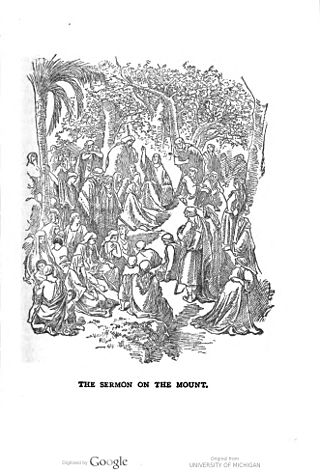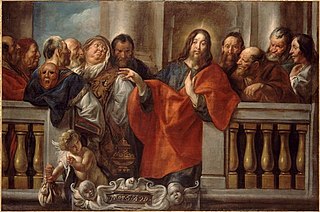
Matthew 3:9 is the ninth verse of the third chapter of the Gospel of Matthew in the New Testament. The verse describes an incident where John the Baptist berates the Pharisees and Sadducees. He has previously called them a brood of vipers and warned them of the wrath to come and has urged them to repent. In this verse he warns that their links to Abraham will not save them.

Matthew 4:24 is the twenty-fourth verse of the fourth chapter of the Gospel of Matthew in the New Testament. This verse is part of a brief summary of and introduction to Jesus' ministry in Galilee, which will be recounted in the next several chapters. This verse relates Jesus' fame "throughout all Syria" and summarizes his work of healing.

Matthew 5:4 is the fourth verse of the fifth chapter of the Gospel of Matthew in the New Testament. It is the second verse of the Sermon on the Mount, and the second of what are known as the Beatitudes.

Matthew 5:47 is the forty-seventh verse of the fifth chapter of the Gospel of Matthew in the New Testament and is part of the Sermon on the Mount. This is the third verse of the final antithesis, that on the commandment: "Love thy neighbour as thyself". Jesus here gives another example of why one must love one's enemies.

Matthew 6:18 is the eighteenth verse of the sixth chapter of the Gospel of Matthew in the New Testament and is part of the Sermon on the Mount. This verse concludes the discussion of fasting.

Matthew 6:31 and Matthew 6:32 are the thirty-first and thirty-second verses of the sixth chapter of the Gospel of Matthew in the New Testament and is part of the Sermon on the Mount. This verse continues the discussion of worry about material provisions.

Luke 15 is the fifteenth chapter of the Gospel of Luke in the New Testament of the Christian Bible. The book containing this chapter is anonymous, but early Christian tradition uniformly affirmed that Luke the Evangelist composed this Gospel as well as the Acts of the Apostles. This chapter records three parables of Jesus Christ: the lost sheep, the lost coin and the lost or 'prodigal' son, a trilogy about redemption that Jesus tells after the Pharisees and religious leaders accuse him of welcoming and eating with "sinners".

Matthew 7:28 is the twenty-eighth verse of the seventh chapter of the Gospel of Matthew in the New Testament. It forms the first part of a two verse conclusion following the Sermon on the Mount.

Matthew 9:9 is the ninth verse in the ninth chapter of the Gospel of Matthew in the New Testament.
Matthew 9:10 is a verse in the ninth chapter of the Gospel of Matthew in the New Testament.
Matthew 10:42 is a verse in the tenth chapter of the Gospel of Matthew in the New Testament.

Matthew 15:9 is the ninth verse in the fifteenth chapter of the Gospel of Matthew in the New Testament.
Matthew 9:11 is a verse in the ninth chapter of the Gospel of Matthew in the New Testament.
Matthew 9:12 is a verse in the ninth chapter of the Gospel of Matthew in the New Testament.
Matthew 9:13 is a verse in the ninth chapter of the Gospel of Matthew in the New Testament.
Matthew 9:14 is a verse in the ninth chapter of the Gospel of Matthew in the New Testament.

Matthew 10:4 is the fourth verse in the tenth chapter of the Gospel of Matthew in the New Testament.

Matthew 10:7 is the seventh verse in the tenth chapter of the Gospel of Matthew in the New Testament.
Matthew 11:12 is the twelfth verse in the eleventh chapter of the Gospel of Matthew in the New Testament.

Matthew 10:27 is the 27th verse in the tenth chapter of the Gospel of Matthew in the New Testament.













